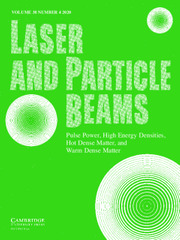Article contents
Two-dimensional simulation of initiation and evolution of a plasma channel in the XeCl laser pumping discharge
Published online by Cambridge University Press: 21 August 2003
Abstract
We present two-dimensional simulation results of the formation and evolution of a diffuse plasma channel in the XeCl pumping discharge. Channel formation was initiated by metallic convexity at the cathode surface with a characteristic dimension of ∼0.1 cm. Two pumping regimes were considered. Initial voltage in the second regime was increased 1.6 times and impedance was decreased 2 times in contrast with the first regime. Evolutions and spatial distributions are presented for electron density, electric field, and frequencies of the main process. In the first regime, the diffuse plasma channel forms. The main processes causing development of the plasma channel are inhomogeneous distribution of the electric field, increase of the stepwise ionization frequency at ne ∼ 1015 cm−3, and depletion of HCl. Increasing of the initial voltage and decreasing of the impedance in the second regime results in a quick rise of the discharge current and electron density in the discharge gap, and uniform discharge takes place during the current pulse.
Information
- Type
- Research Article
- Information
- Copyright
- © 2003 Cambridge University Press
- 5
- Cited by

